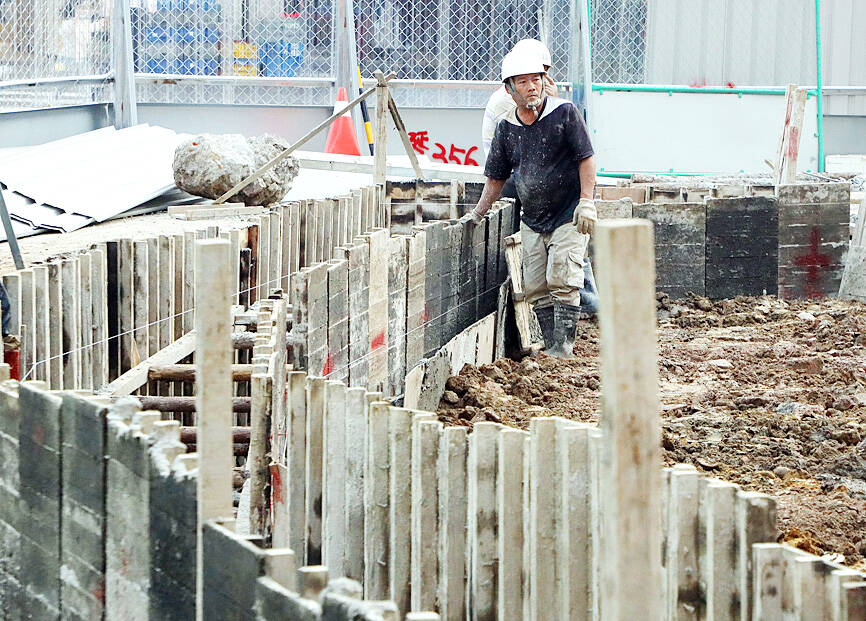Average monthly take-home pay in February increased 2.52 percent from a year earlier to NT$45,917, while total wages — which includes overtime pay, performance-based commissions and bonuses — soared 54.84 percent to NT$81,576 on the back of Lunar New Year bonuses, the Directorate-General of Budget, Accounting and Statistics (DGBAS) said yesterday.
Taiwanese firms on average issued Lunar New Year bonuses equivalent to 1.69 months of regular wages, or NT$77,348, the highest in nine years and up from 1.68 months a year earlier, Census Department Deputy Director Chen Hui-hsin (陳惠欣) said.
“The improvement came after service providers benefited from sustained revenge consumption in the post-COVID-19 pandemic era, although manufacturers took a hit from a global slowdown,” Chen told a news conference.

Photo: CNA
Financial and insurance companies offered the highest bonuses, averaging 3.64 months of wages, or NT$251,402, she said.
Manufacturers distributed 2.11 months of year-end bonuses, lower than the 2.14 months last year, she said, adding that suppliers of electronic components gave 2.76 months of bonuses, also weaker than 2.8 months a year earlier.
Exporters of tech and non-tech products had idle capacities and headcounts last year as they grappled with business declines induced by inventory adjustments and global inflation, Chen said.
Recreational facilities, hotels and restaurants fared better, issuing bonuses of 0.44 months to 0.74 months, compared with smaller bonuses or none last year, she said.
In the first two months of this year, regular take-home pay rose 2.39 percent annually to NT$46,017, while overall wages expanded 3.74 percent to NT$81,982, she said.
Real take-home wages after inflation remained in positive territory for the first time in two years with a 1.29 percent uptick as inflation pressure eased, Chen said.
The timing of the holiday also played a role, as local companies sometimes distribute year-end bonuses in December when the Lunar New Year is in January, she said.
Regular monthly wages have a fair chance of beating inflation due to the wage hikes and consumer price data, Chen said.
Holiday disruptions also explained why the number of workers hired in the industrial and service sectors in February shrank 0.25 percent, or about 21,000 people, compared with January, the DGBAS said.
Most firms halted operations for the holiday, it said.
As a result, the accession rate in February shed 0.07 percentage points to 2.04 percent, while the dropout rate gained 0.24 percentage points to 2.29 percent, it said.

Nvidia Corp’s demand for advanced packaging from Taiwan Semiconductor Manufacturing Co (TSMC, 台積電) remains strong though the kind of technology it needs is changing, Nvidia CEO Jensen Huang (黃仁勳) said yesterday, after he was asked whether the company was cutting orders. Nvidia’s most advanced artificial intelligence (AI) chip, Blackwell, consists of multiple chips glued together using a complex chip-on-wafer-on-substrate (CoWoS) advanced packaging technology offered by TSMC, Nvidia’s main contract chipmaker. “As we move into Blackwell, we will use largely CoWoS-L. Of course, we’re still manufacturing Hopper, and Hopper will use CowoS-S. We will also transition the CoWoS-S capacity to CoWos-L,” Huang said

Nvidia Corp CEO Jensen Huang (黃仁勳) is expected to miss the inauguration of US president-elect Donald Trump on Monday, bucking a trend among high-profile US technology leaders. Huang is visiting East Asia this week, as he typically does around the time of the Lunar New Year, a person familiar with the situation said. He has never previously attended a US presidential inauguration, said the person, who asked not to be identified, because the plans have not been announced. That makes Nvidia an exception among the most valuable technology companies, most of which are sending cofounders or CEOs to the event. That includes

TARIFF TRADE-OFF: Machinery exports to China dropped after Beijing ended its tariff reductions in June, while potential new tariffs fueled ‘front-loaded’ orders to the US The nation’s machinery exports to the US amounted to US$7.19 billion last year, surpassing the US$6.86 billion to China to become the largest export destination for the local machinery industry, the Taiwan Association of Machinery Industry (TAMI, 台灣機械公會) said in a report on Jan. 10. It came as some manufacturers brought forward or “front-loaded” US-bound shipments as required by customers ahead of potential tariffs imposed by the new US administration, the association said. During his campaign, US president-elect Donald Trump threatened tariffs of as high as 60 percent on Chinese goods and 10 percent to 20 percent on imports from other countries.

INDUSTRY LEADER: TSMC aims to continue outperforming the industry’s growth and makes 2025 another strong growth year, chairman and CEO C.C. Wei says Taiwan Semiconductor Manufacturing Co (TSMC, 台積電), a major chip supplier to Nvidia Corp and Apple Inc, yesterday said it aims to grow revenue by about 25 percent this year, driven by robust demand for artificial intelligence (AI) chips. That means TSMC would continue to outpace the foundry industry’s 10 percent annual growth this year based on the chipmaker’s estimate. The chipmaker expects revenue from AI-related chips to double this year, extending a three-fold increase last year. The growth would quicken over the next five years at a compound annual growth rate of 45 percent, fueled by strong demand for the high-performance computing